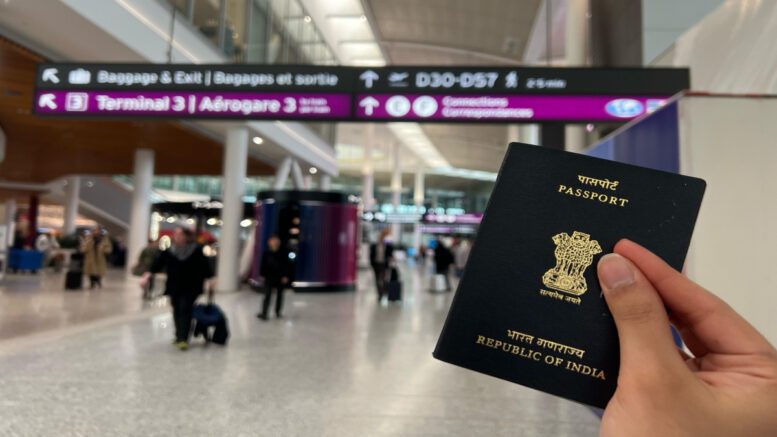In the fall of 2021, I waited in line to board an international flight to Canada from Delhi. In retrospect, everything around me had been so chaotic, children running around, infants sobbing, passengers whipping out their bags at the last minute to find their documents, making sure they had some extra masks on hand. However, at that time my mind felt empty. I closed my eyes, put on my headphones and tuned out the noise.
It was when I finally sat in my seat that it hit me. I was leaving. Leaving for university in a country that I had never been to, flying alone, something that I had never done before, and I would be far away from home for the coming year. The COVID-19 pandemic was at its peak, so trying to find a friendly face was a lost cause because they were all covered in masks. I had just been thrown into the deep end of the pool, and the overwhelming stress of the financial burden certainly didn’t help.
One International student immigration advisor says that over the past couple of months, students have been getting increasingly anxious about their future.
That’s partly because Minister of Immigration, Refugees and Citizenship Canada (IRCC), Marc Miller, recently announced that Canada will cap the intake of international student permit applications this year, resulting in a 35 per cent decrease from 2023.
It means that becoming an international student is becoming progressively harder as the gates narrow and the pile of required documents gets longer.
“This is what our past couple of months have been really, a lot of anxiety from new students because, again, it’s more that we didn’t know,” said Kendel Chitolie, international student immigration adviser at the University of Toronto Scarborough. “We were waiting for the province and the federal government to come up with a plan.”
The cap brings uncertainty for students specifically from India, who according to the Canadian Bureau for International Education make up over 41 per cent of international students in Canada. As potential students grapple with this change, will the “land of immigrants” no longer be a safe haven for them?
WATCH | A student adviser discusses the new study permit cap :
Ontario Premier Doug Ford recently said that the province was “blindsided” by the federal government’s cap. In 2019, the Ford government cut tuition in Ontario. A majority of the universities in the province are grappling with inflation and COVID costs along with the hold on revenue brought in by international students.
This has a major impact on Ontario, where 52 per cent of international students landed in Canada as of 2023.
But what does the cap mean for international students? They now face even more competition to secure a golden ticket that will be their portal to their dream school.
Read more from the Toronto Observer:
- Thorncliffe Park and East York Meals on Wheels team up for Ramadan
- Has spring arrived in East York?
- Increased neurodiversity awareness has prompted more ADHD supports, ADHD coach says
“Since Jan. 22, 2024, most new study permit applications must include a provincial attestation letter (PAL) from a province or territory with their study permit application,” said Rémi Larivière, a spokesperson for IRCC.
“This attestation serves as proof that the student has been accounted for under a provincial or territorial allocation within the national cap,” said Lariviere.
Unless otherwise exempted, IRCC will return any application that is not supported by a PAL. That means a potential international student must jump through new hoops to get one of the letters.
“In order for them to get that PAL, they have to accept their offer, pay the deposit, and then request the provision attestation letter. So that is an additional step from before,” said Chitolie.
In a press release, IRCC cited reasons to impose the cap which included the pressure on housing and health services along with other essential services. It also stated that international students are vulnerable to “bad actors” that the government is attempting to resolve by stabilizing their growth in Canada.
“I think the housing crisis, I think it’s a combination of a lot of things, but I think with how it was portrayed, it seems that it was caused by international students,” said Chitolie.
He acknowledged that the number of international students being brought in is a contributing factor but that there is more to these crises.
While students are welcomed in Canada, they don’t all have the same ideal experience. What seems like a picture-perfect image can quickly change as you get closer.
“They’re [students] told certain things about how that institution looks like but when they come here, they’re shocked to find it might just be like one room of a college with very limited opportunities, and now they’re enrolled in for the year and there are no refunds available,” said Ritika Saraswat, founder and CEO of Re-Defined, a non-profit organization started to support international students.
WATCH | The founder of a non-profit serving immigrating students discusses about the international study permit cap:
As a former international student from India herself, Saraswat questions the need to leave home countries. “I think we all have idolized just coming abroad,” she said.
“I feel like what sometimes people are chasing is the higher dollar amount. But what we don’t realize is also the higher cost of living.”
There have been concerns about Canada’s ability to sustain the growth of international students especially in light of the inability of institutions to support them, along with the limited opportunities available.
There may after all be a silver lining to this cap. In the long run, it may prove beneficial for international students who wish to pursue post-secondary education in Canada.
“Now, what’s happening is that you have quality students coming in and quality institutions existing who actually have the infrastructure on ground and the resources to support the students with the post-degree as well,” said Saraswat.

